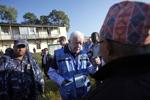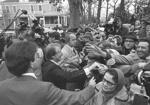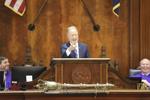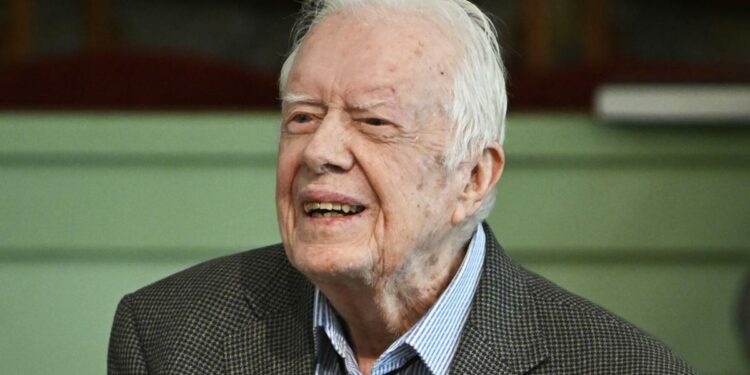Jimmy Carter with wife Rosalynn Carter at the Democratic National Convention in Madison Square Garden in New York on July 15, 1976. (AP Photo)
Anonymous
According to presidential aide Stuart Eizenstat, who took notes at the meeting, Mr. Carter replied, тАЬI need to get somebody in here who will take care of the economy тАФ let me take care of the politics.тАЭ
Mr. Carter opened diplomatic relations with China and got Congress to create a special protective relationship with Taiwan. He arranged the controversial return of the Panama Canal to Panama, made human rights a major focus of U.S. foreign policy toward the Soviet Union, created the Cabinet-level departments of Energy and Education and instituted the federal deregulation of transportation and other economic sectors. He was one of our greenest presidents, leaving a lasting mark through his environmental and conservation efforts, including doubling the size of the National Park System.┬а┬а
Significantly, his eight-day private meeting with Israeli Prime Minister Menachem Begin and Egyptian President Anwar Sadat resulted in the Camp David Accords that led to peace between Egypt and Israel. Both Mr. Begin and Mr. Sadat were awarded the Nobel Peace Prize for their agreement.

But Mr. CarterтАЩs greatest personal strength, his directness and honesty, also limited him as a politician. As Mr. Eizenstat observed in a biography of his former boss, Mr. CarterтАЩs concern that the nation was headed in the wrong direction led to speeches that preached “sacrifice and pain,” in contrast to Ronald ReaganтАЩs sunnier message of “hope and optimism.” He often told supporters at campaign rallies, “I wonтАЩt lie to you.”
In July 1979, the nation faced high inflation and a serious gasoline shortage. Mr. Carter decided it also faced a crisis of confidence. He assembled a wide range of advisers at Camp David to get their views. In what widely became known as his тАЬmalaiseтАЭ speech, President Carter cited some of the advice he had received:┬атАЬThis from a Southern governor: тАШMr. President, you are not leading this nation┬атАФ youтАЩre just managing the government.тАЩтАЭ
That governor was South CarolinaтАЩs Richard Riley.

President-elect Jimmy Carter shake hands with a crowd of tourists outside Plains Baptist Church. The future first family attended services there on Sunday, Jan. 2, 1977. (AP Photo)
Anonymous
Sadly for Mr. Carter, the “crisis of confidence” speech failed to rally the nation, in part because on top of the energy crisis and Mr. VolckerтАЩs recession, the Soviet Union had invaded Afghanistan and revolutionaries in Iran took U.S. diplomats hostage.
The abysmal failure of a military rescue mission made Mr. Carter seem even more ineffective and came to define his presidency in many eyes. The Iranians held the U.S. hostages for 444 days, until the final hours of his presidency.
But former Gov. Riley looks back on Mr. CarterтАЩs lifetime achievements with respect. While still a state senator, Mr. Riley became one of Mr. CarterтАЩs earliest supporters because he liked his ideas and found him honorable.

Mr. Carter returned the respect, calling on Mr. Riley for a number of tasks, among them serving on the first official American delegation to China.
The two stayed in touch after both left elective office. Mr. Carter founded the Carter Center. Mr. Riley became President Bill ClintonтАЩs secretary of education.
A few years ago, Mr. Riley summed up the Carter legacy: a devout Christian, a тАЬvery patriotic manтАЭ and тАЬa great role model.тАЭ
Click here for┬аmore opinion content┬аfrom The Post and Courier.
Source link : http://www.bing.com/news/apiclick.aspx?ref=FexRss&aid=&tid=6773161613dd4cd48070e58348824999&url=https%3A%2F%2Fwww.postandcourier.com%2Fopinion%2Feditorials%2Fjimmy-carter-legacy-richard-riley-sc%2Farticle_b0756e0c-5fe6-11ea-bd4b-1b4ffd3cef40.html&c=16969802081145528786&mkt=en-us
Author :
Publish date : 2024-12-30 07:45:00
Copyright for syndicated content belongs to the linked Source.












